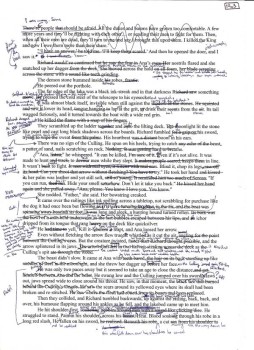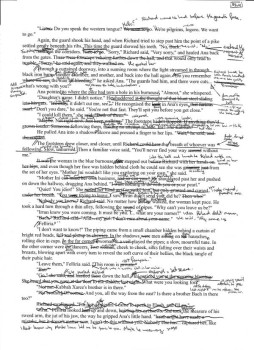I write my first drafts on the computer, but I edit on paper. Why? Because it’s better, that’s why.
No, but seriously, writing is editing and rewriting, and everyone needs to find a method of editing that works for them. As I’m approaching the end of my final draft of Century of Sand, I thought I’d take a bit of time to talk editing, and how I go about it.
First, I take a long break from my novel, so that I can return to it with fresh eyes. How long is long? For me, four to six months. That’s how long I need to forget everything that happens, to be able to read my first draft as if it were written by somebody else. Some people can do that within a few weeks – for me, half a year is best.
After that, I have a long sit-down with the book, re-read it quickly, and identify what was missing in the early draft. Reader feedback helps a lot with this – in Century of Sand, what all my test readers identified was a lack of character consistency, a lack of worldbuilding, and scenes that flew by much faster than they had right to.
So, I make a plan to fix it. I plan out a web of character development from the start of the book to the final page. I find points where the world is undernourished and fill it with detail, and then find ways to deliver that detail without resorting to exposition. I take a look at overall pacing, and find points where the chapters could be expanded or crushed down in order to inject more tension. Then, I print out a copy of the entire book and get scribbling.
As you can see, I scribble a lot. I cut a lot of text, mostly exposition and redundant phrasing. I try to pare everything down so it flows better. I find points where too many consonants grate on the ear, or where the rhythm of a sentence gets bogged down. I’m also trying to find points where things move too fast, marking them with ADD TENSION or similar, and little XXX marks where I need exposition but don’t have space on the page.
Why do I do this on paper instead of on the screen? There are a couple reasons. First, when I edit on screen I tend to only be able to work sentence-to-sentence. I can’t glance a page ahead and think, that paragraph would be so much better over there. I can barely think in terms of moving phrases a few paragraphs up or down. I can’t see that I’ve reused a term or expression twice or three times in the same five hundred word stretch.
Secondly, reading on paper will always feel different to reading on a screen. When working on my laptop, it’s easy to get distracted and tab away to Firefox, or MSN, or Facebook. When I return to the book, the pacing is lost. Working on paper ensures that I can at least feel out the pacing and structure page by page, instead of minute by minute.
Editing on paper allows you to be bold. Scratch that paragraph with a single wobbly line, and it’s gone. Delete it on screen, and there’s always the temptation to undo and slap it back into place, even though you know the piece would be stronger without it. Put simply, paper lets you kill your darlings. Editing digitally lets you resurrect them when they should have stayed dead.
So, once the page is scribbled to hell and I’m happy with the results, I retype with my notebook open beside me, making sure to edit in all those major changes I spoke about earlier, like character and world development. Sometimes the plot diverges so wildly that I scrap entire pages and chapters – that’s just the nature of the beast, I suppose. Other times, such as with the two scanned pages, I can keep the rough structure of what came before and just fill in the gaps.
I retype, and I proofread, and I retype, and at the end I have a shiny new draft. Then I send it out to friends, and prepare to get torn apart all over again.
So, that’s my process, but I’m still interested in how you folk go about editing. Paper or screen? Mass deletions or little tweaks?
Want more info on the discipline of writing? Check out my collection of articles!
(Originally published in September 2011)

